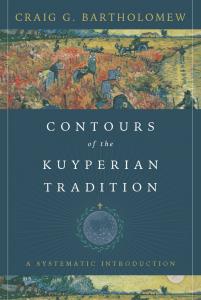Kuyper mania is sweeping the nation! Okay, not really. But at least in obscure corners of Evangelicaldom, including my desk in rural Missouri, people are excited to see the writings of Abraham Kuyper being translated into English. Although expensive, these volumes are surely going to be essential reading for any Christian who wants to think carefully about the relationship between church and the culture.
Which means those who have long been interested in Kuyper have found their moment. We’ve seen books about him and his thought slowly but steadily making their way into the wider marketplace. Of these books, I read Craig Bartholomew’s Contours of the Kuyperian Tradition for two reasons:
- I love Abraham Kuyper, and am (as noted above) super excited about the translation project. (The first volume of Kuyper’s Common Grace is high on my “to-read” list.) As such I’m always interested in learning more about Abraham Kuyper and his thought.
- While I’m not an expert in the field, my impression is that a large percentage of those who claim to be “Kuyperians” are on the political or theological left. Given Kuyper’s starting point as one of the founders of the Anti-Revolutionary Party (a deeply politically conservative organization) and his virtually unmarred Protestant/Calvinist credentials, somewhere along the way something must have gone awry with the Kuyperian tradition. (Most famous in recent days, for example, is Nicholas Wolterstorff’s abandonment of marriage) I want to know what it is.
Contours of the Kuyperian Tradition meets the first of these reasons quite nicely. Bartholomew has given us an excellent exposition of Kuyper’s thought in many areas that will be of interest to all thoughtful readers. The chapters on education, philosophy, and sphere sovereignty are especially helpful. If there is something missing (and I’m not familiar enough with Kuyper’s works to know if he just didn’t write much about it, what with my not speaking Dutch and all), it is a chapter on Kuyper on justification. Kuyper is famous for his declaration of the Lordship of Christ over all of creation. At least in the handful of Kuyper’s works that I have read, that “Lordship” is not separable from the penal substitution accomplished at the cross. For example, in Kuyper’s Work of the Holy Spirit (one of his few writings available in English prior to the current translation project), he castigates the modern world for forgetting this core truth:
“For, behold, our objection is not that you deny the reconciliation through His blood, but that, by being silent on the question of God’s right, and of our state of condemnation, and by being satisfied when the people “only come to Jesus,” you allow the consciousness of guilt to wear out, you make genuine repentance impossible, you substitute a certain discontent with oneself for brokenness of heart; and thus you weaken the faculty to feel, to understand, and to realize what the meaning is of reconciliation through the blood of the cross.”

Kuyper decried modern unwillingness to call out sin, guilt, and the necessity of a substitute. The working out of that great Biblical truth in the place of his theology would have been welcome. Which, as I often say on this blog, is not exactly a criticism of the book in that I’m basically saying I wish the book were longer.
In terms of my second reason for reading Contours of the Kuyperian Tradition, wanting to see how we get from Kuyper to those who claim his mantle in the 21st century, this book falls a bit flat. Much of Contours is focused on an articulation of the thought of Kuyper himself—which is fine with me (see reason 1), as well as the thought of Herman Bavinck. Bavinck was Kuyper’s contemporary and certainly an important figure, but he was much more a part of the fountainhead of the “Kuyperian Tradition” than a proper part of it. It is as if we wanted to understand the “Jeffersonian Tradition” and attempted to do so by digging primarily into the writings of Jefferson and Madison. We would certainly learn a lot about the thought of Jefferson and Madison (as we do from Contours about Kuyper and Bavinck), but not so much about their descendants/tradition.
Now to be fair, there are later philosophers and theologians who are discussed: G.C. Berkouwer, J.H. Bavinck, and Herman Dooyeweerd get the most coverage. And while I don’t deny the great importance of these thinkers as Kuyper’s heirs, three men do not a tradition make. Certainly others are mentioned in passing or even discussed to some extent, but none in sufficient detail that we can really call this a book about the “tradition” as opposed to just being an exposition of Kuyper’s thought. Which I suppose is yet another way of saying that I wish the book were longer. Or at least I wish it had a different title, which is undoubtedly an issue with the publisher rather than with the author.
If I were a better writer or less of a cranky old man at heart, I’d be able to make some of the above sound more positive, because again I did enjoy the book and I do recommend that those interested in Kuyper’s thought read it. And, as I suspect Bartholomew would agree, I hope that if you do read it you are likewise inspired to go and read Kuyper himself.
Dr. Coyle Neal is co-host of the City of Man Podcast and an Associate Professor of Political Science at Southwest Baptist University in Bolivar, MO.













